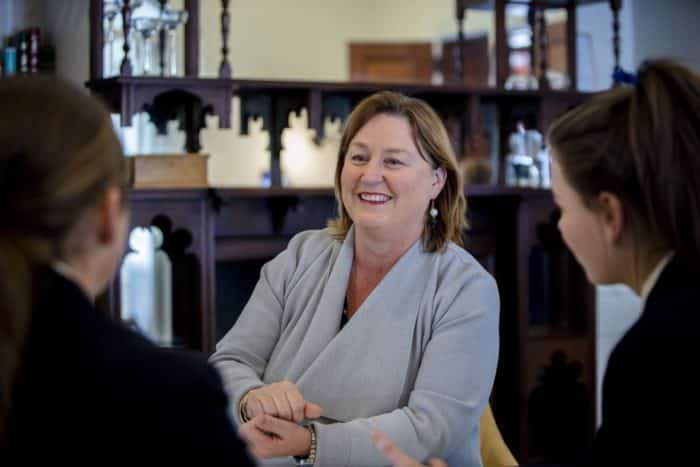Across Australia, and in fact the world, debate has raged for several years about the types of skills and capacities our adolescents will need to make a positive contribution in the future. Large organisations, including the OECD’S Programme for International Student Assessment (PISA), the Foundation for Young Australians (FYA) and the Melbourne Graduate School of Education (MGSE) have all gathered data which seek to find solutions to questions such as these. As new industries materialise and new technologies emerge further thought is put into the question of how schools are preparing students for the world beyond their classrooms. There is no doubt that we will need brilliant scientists, analytical mathematicians, erudite writers and sustainably minded geographers, but much of the literature now recognises that people will need new mindsets, they will need to develop the capacity to adapt quickly, to fail and to fail fast, being responsive to situations and applying data to new and novel situations. It is for this reason that I believe that entrepreneurship, if taught explicitly in schools, is the most important subject any student, but even more so females, can learn. Let me explain further.
To begin, a look into what the current data actually suggests. At present in Australia 34% of our companies are run by women in comparison to 66% run by men. [1] Not only is this a serious underrepresentation of one segment of the population, but alarmingly, in the last 20 years, the amount of female representation has only increased by 3%.[2] In 2020, US magazine ‘Fortune’ proudly gloated that “The number of women running America’s largest corporations has hit a new high” 37 of the companies on this year’s Fortune 500 are led by female CEOs.[3] This gender imbalance is disturbing to me as a female, a mother of a daughter and a teacher of girls. In Australia, it’s a similar story. In an article published in September last year by the Sydney Morning Herald titled ‘Absolutely no progress’: Number of female CEOs in Australia is declining’[4] the figure of 10 women occupying the top job among ASX200 companies was given. As Sheryl Thai from The League of Extraordinary Women often says when speaking to our Year 9 students, “you can’t be what you can’t see” and the lack of role models, pathways and embedded educational programs designed to enable women to fulfil leadership roles is disturbing. Entrepreneurial education provides students with transversal skills to negotiate and thrive in increasingly complex societies and must be seen as one specific approach to enable schools to address these gender issues and the lack of female activation in commercial enterprises.
“An entrepreneur is an owner or manager of a business enterprise who makes money through risk and initiative.” [5] Entrepreneurship in schools, when taught explicitly, is real-world learning. It is totally authentic, never contrived and seeks to encourage students to meet specific objectives. “For learners to develop these skills or capabilities, the organisation of learning must provide students with the opportunities to truly exercise their capacities.”[6] This involves, adaptation, response to competition, meaningful application of statistics and data, feedback, negotiation and innovation. This is not a lemonade stand or a person baking a few cupcakes to sell, much as they can be enterprising in nature, this is a series of curated, intentional experiences designed to teach and give students opportunities to practise being curious and creative, forming a vision, taking a risk and being tenacious. Importantly, students need to understand that the skills and capacities they are learning are highly transferrable. Not all students will go on to run their own business post school, but they may be intrapreneurs or run teams and business units within larger companies where the same skills are crucial. In order for women to play a larger role in the upper echelons of business, they must first have the attributes to ensure that their journey can be a successful one.
Our Envision program at Tay Creggan fulfils two main aims of teaching entrepreneurship. Firstly, it provides an authentic learning experience for all students where risks can be taken and lessons learned. Not all businesses thrive. Feedback can be harsh as the stakes are high. The program allows female students a chance to lead their own company – to have a ‘taste’ of what this feels like, to sit in discomfit at times, to have difficult conversations with business partners and to be challenged. Secondly, it is a brilliant mechanism to explicitly teach future proofing skills to young women, on the cusp of their senior years of schooling. If we want more female CEO’s this is where the rubber meets the road.


In 2021, the third year of Envision at Year 9, the program continues to expand. We retain our valuable partnership with The League of Extraordinary Women, work closely with the Wade Institute at The University of Melbourne and surround our students with mentors and role models who have life experiences to share. At the start of this term we planned for a face-to-face market, two weeks later, that avenue of sales was closed. Established last year by three entrepreneurial students, the online Envision Marketplace has continued to provide authentic experiences and student learning is immense. Our female businesswomen can articulate their value propositions, they know their customer segments and they are all tracking their progress on excel spreadsheets that VCE Accounting teachers would be proud of. They have been forced to “Pivot, Punt or Persevere” with their ideas.
From our 37 businesses in 2021, 31 have successfully launched, with a couple more about to burst onto the scene. At the time of writing, 866 individual items have been purchased and over $7,400 of gross sales have been earned in just under a week. Tax, in the form of a charity donation to Rotary Charity FORaMEAL will be paid (it is real-world learning after all!) $20 Seed Funding and Shareholder investor payments will be returned and businesses will complete their financial statements and understand their balance sheets. Important time will be spent reflecting on how each business operated, on lessons learned and on making notes about what might be done differently in the future. Each year, a couple of enterprising students continue their business without the support of the school marketplace. Whilst it will be outstanding to celebrate the financial success of almost all of our 2021 businesses, even better will be the knowledge that this group of female entrepreneurs has augmented their toolbox of life-ready skills, so that regardless of the industry they end up in, they are ready to make critical decisions, and be strong and capable leaders.
Mrs Karyn Murray
Head of Year 9 – Tay Creggan
References
Jean-Pierre Béchard & Jean-Marie Toulouse (1991) ENTREPRENEURSHIP AND EDUCATION: VIEWPOINT FROM EDUCATION, Journal of Small Business & Entrepreneurship, 9:1, 3-13, DOI: 10.1080/08276331.1991.10600386
Tomas Chamorro-Premuzic (2020) ‘Why You Should Become an “Intrapreneur”’Harvard Business Review
Milligan S, Luo R, Hassim E, Johnson J ((2020) Future Proofing Students What they need to know and how to assess and credential them. Melbourne, Australia MGSE Industry Report #2
Youngson L, (2017) Women’s Entrepreneurship – the state of women’s representation in the Australian StartUp ecosystem, why we need to improve it and how to get there. Wade Institute, University of Melbourne.
[1] Women’s Entrepreneurship – the state of women’s representation in the Australian StartUp ecosystem, why we need to improve it and how to get there.
[2] Women’s Entrepreneurship – the state of women’s representation in the Australian StartUp ecosystem, why we need to improve it and how to get there.
[3] https://fortune.com/2020/05/18/women-ceos-fortune-500-2020/
[4] https://www.smh.com.au/business/companies/absolutely-no-progress-number-of-female-ceos-in-australia-is-declining-20200916-p55w5m.html
[5] https://www.forbes.com/sites/ericwagner/2012/06/05/7-traits-of-incredibly-successful-entrepreneurs/?sh=bca639177775
[6] Future Proofing Students MGSE Industry Report #2


